The “Monitoring Water and Energy Justice in the Favelas” research course was initially conceived in late 2020 by favela collectives involved in the Covid-19 in Favelas Unified Dashboard (PUF). The dozens of groups involved realized that the data they had collected on the Covid-19 pandemic and new and important knowledge and techniques they had created should not be squandered. A key learning was understanding why it is so important that favelas take on the reins of research for themselves. With this in mind, the collectives and groups involved with PUF, together with the Sustainable Favela Network (SFN)* and various institutional partners, proposed and developed the course in 2021 and realized it subsequently in 2022.
The course took place from March-September 2022 with 30 youth and 15 community leaders from 15 different favelas across Greater Rio. The aim was to demystify data collection and analysis, transferring control over data captured on favelas to residents themselves. Over 50 lessons took place, twice a week, delivered online by the SFN’s technical partners and managing team, and included four full-day immersive in-person classes. The course structure went through all planning, delivery, and advocacy stages of a research project, the indicators determined collectively by participating organizations. Consequently, the final results weren’t simply the published reports, but primarily the entire process of developing and delivering the course, which was transformative for those taking part. The whole process is shown in the documentary “Get to Know the Course: ‘Researching and Monitoring Water and Energy Justice in the Favelas.”
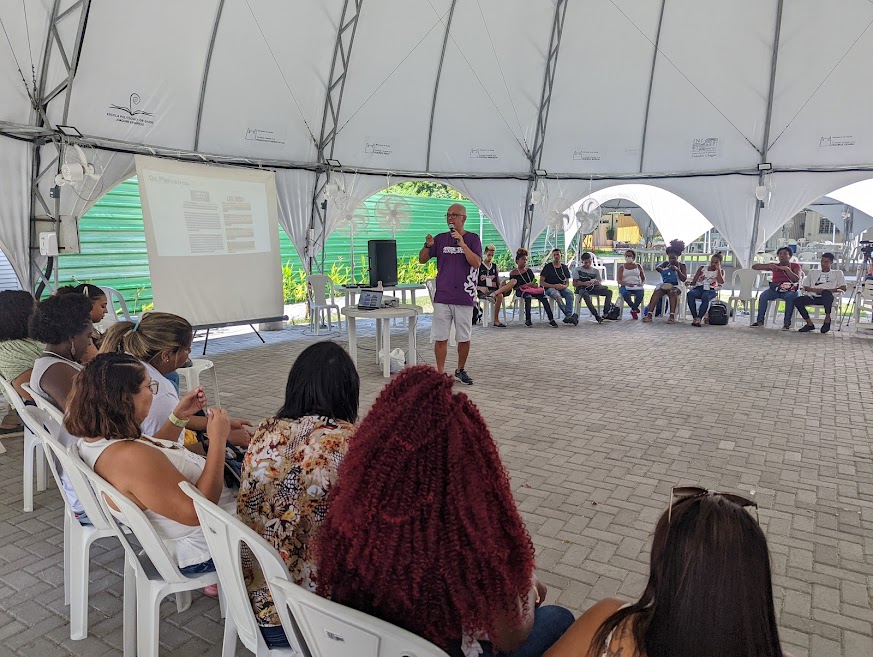
The course consisted of the following modules: (1) the importance of research by and in favelas, (2) understanding energy and water justice in relation to access, quality and efficiency, (3) defining indicators according to local priorities, (4) data collection in the field, (5) data analysis and understanding, and identifying key findings, (6) how to do advocacy with the data collected, (7) how to create both accessible and technical reports, and (8) how to communicate data for political advocacy and public awareness.
“The lack of data on favelas reflects the absence of structural public policies and the importance of producing data on the reality of the favela through how it is perceived by its own residents.” — Alan Brum, Roots in Movement Institute, Complexo do Alemão
The first module of the course debated the importance of citizen-generated data in the favelas; that is, the importance of favelas producing their own data. The module looked at how the absence of data on the favelas is part and parcel of the historic and selective process of Brazilian government neglect of these communities. As with other rights that are precariously met in favelas, such as health, education, sanitation, security, and mobility, data production on these services and other challenges is equally scarce. This lack of data on the lived experiences of favelas then functions as a cog in a vicious cycle in which problems and their extent are not quantified and, as a result, adequate solutions are not implemented. Generating data by and for the favelas is crucial to breaking this cycle, producing favela-based data to quantify what communities understand as their challenges and proposing appropriate government solutions based on the results. Once again, the traditional favela solution of “by us, for us” fills the gaps left by government. In this module we understood how favelas generating their own data is a mechanism of struggle, policy challenge, and democratic participation.
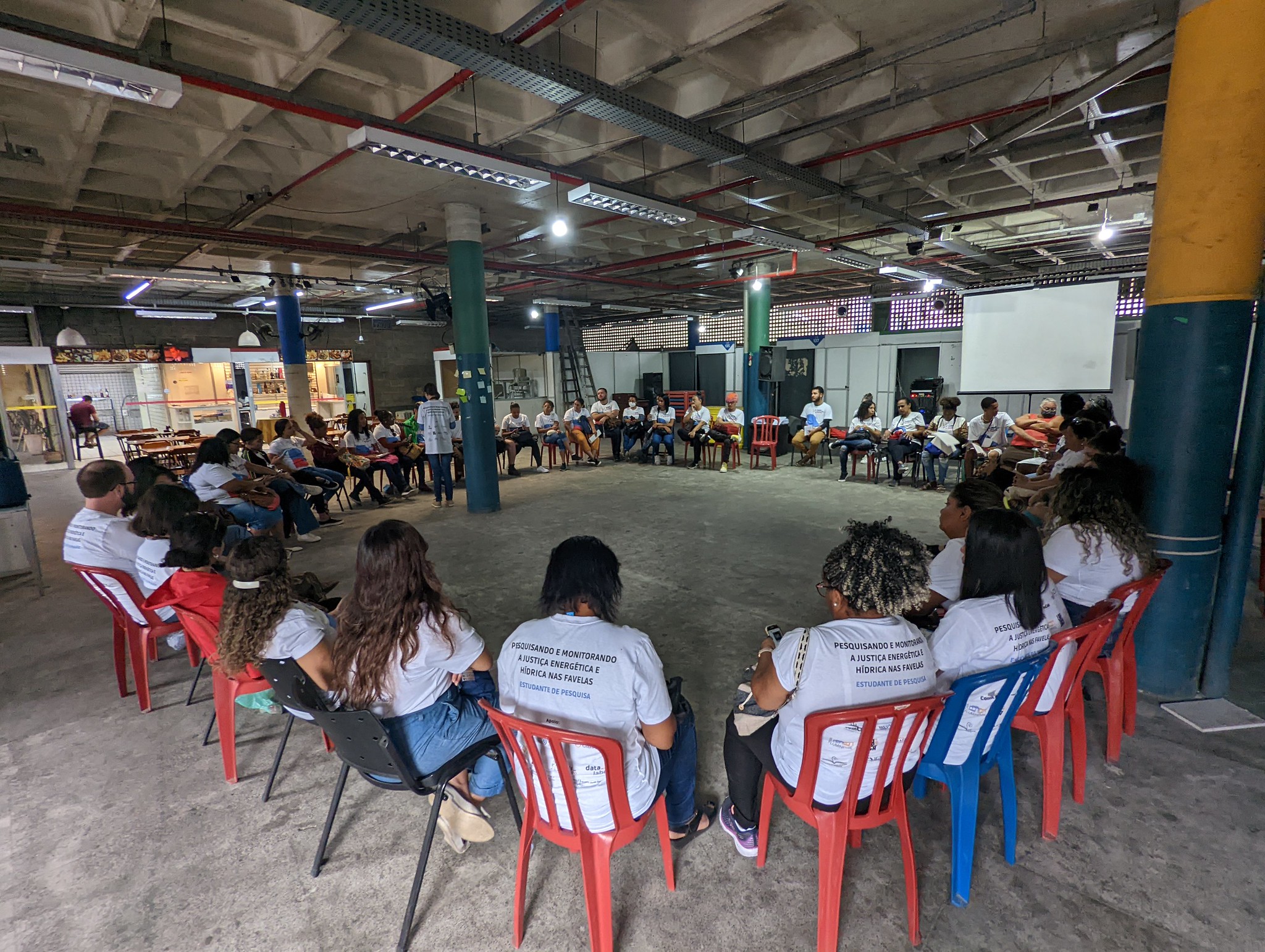
Having discussed the importance of autonomy in generating data, the course entered its second module on water and energy justice, looking at this theme through the lens of access, quality, and efficiency. As such, it aimed to strengthen the notion that water and electricity are basic needs and understanding that depriving citizens of these services constitutes a rights violation. Furthermore, it is not enough to have access: quality and efficiency are also fundamental. In the module, Alexandre Pessoa from Brazil’s national health foundation, EPSJV/Fiocruz, described how water arrives in our taps, the factors and actors involved in guaranteeing access to water, and also about service quality criteria and the water utility’s obligations. Amanda Ohara from the Brazilian Climate and Society Institute (iCS) raised discussions about electricity, covering the Brazilian electricity system, how electricity gets to people’s homes, oversight agencies, electric bill composition, and the Social Electricity Tariff (TSEE).
Lastly, Katrina Dubytz and Colin Taylor from CLASP fleshed out the role of energy efficiency, typically less discussed among favela organizations and collectives. The discussion contemplated daily life in the favelas, considering both the challenges and potentials of efficiency in these locations. The module strengthened the perspective of water and electricity as rights and, by showing how services should be provided, shone a light on the situation of water and energy injustice experienced by favelas.
The next module was to design the study’s electronic survey, which was to be conducted door-to-door in the 15 communities participating in the course. The survey indicators were determined collectively during this module, considering the specificities of each location and possibilities for comparisons. Since the study was an outcome of the course, the survey needed to be based on the interests and demands of participants, considering water and electricity access, quality, and efficiency in their communities. The whole process of constructing the survey—drafting questions, response options, length, respondent anonymity, accessibility, and comprehension—was debated in classes until a test version was ready. This version was then used for training in conducting the survey, carrying out in-person tests, and exchanges to share experiences in the field.
The survey was revised collectively to reach a final version which had around 60 questions and took approximately 15 minutes to complete. After the final version, rehearsals were held with the aim of making sure that all course students were ready to conduct the survey. Maps of the 15 communities were also developed in this module, with communities divided by their census areas so that each was contemplated with at least one household with a view to having a broad geographical distribution of the favelas. The mapping work was led by Renata Gracie from the Institute of Communication and Scientific Information and Technology in Health (ICICT) at Fiocruz.
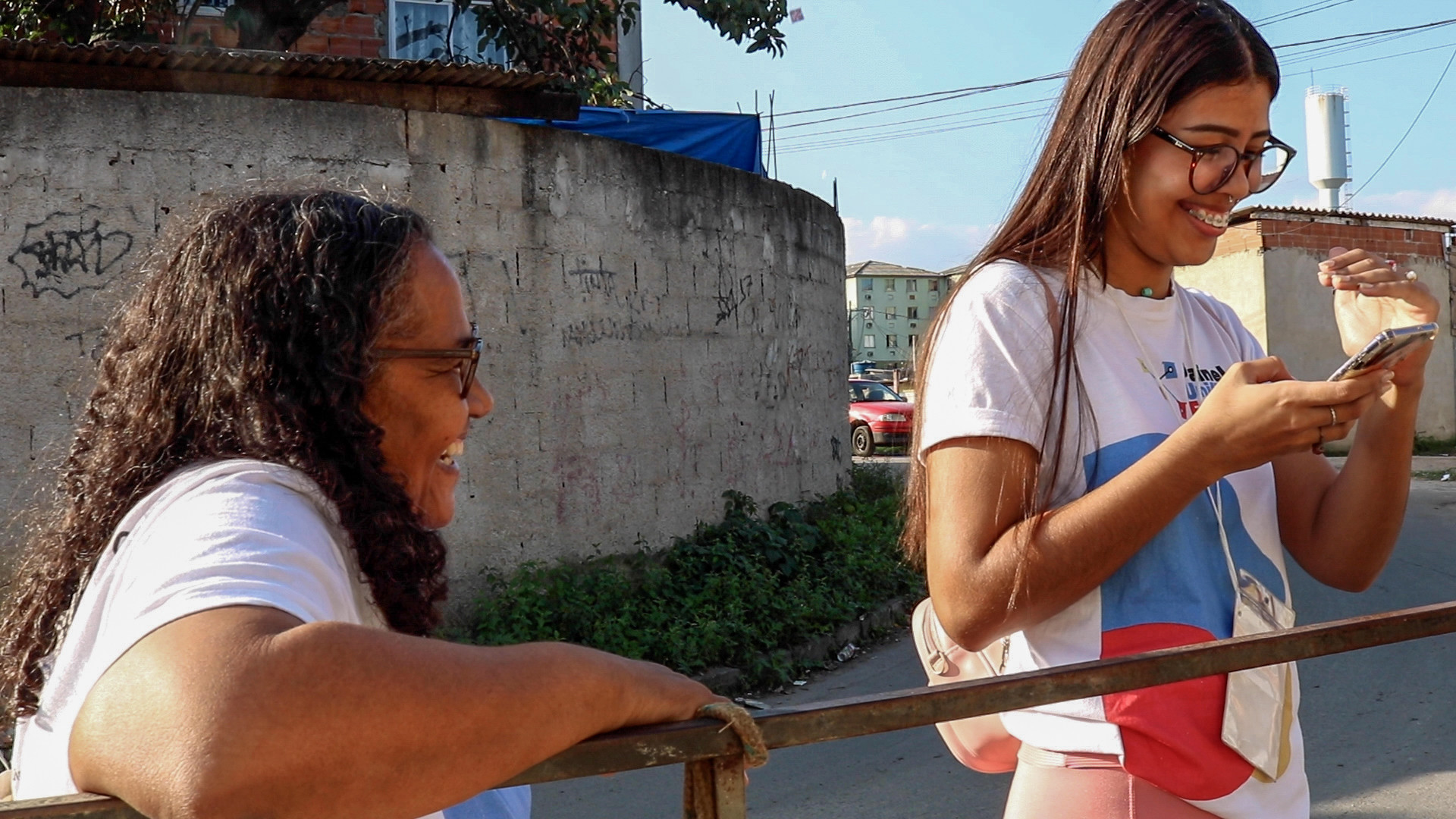
The course continued with data collection in the 15 locations. The 45 student-researchers carried out around 1,200 household surveys. During the survey’s implementation, students shared their experiences in the field during weekly class sessions. As a favela-based research project carried out by local groups, the data gathering period was one of strong connections built between organizations and their respective communities. Everyone came to know more about their own areas and got closer to other residents. Various student-researchers reported the enthusiasm in the community at being listened to. A student from City of God, for example, shared new discoveries about his own favela.
“We went out to do the research yesterday. Here in City of God, there’s a river that runs through the middle splitting the region into better and worse. So yesterday we went to the other part, on the other side of the river, and met a lady there who has no access whatsoever to water. We knew it was a very precarious area but we didn’t know the extent.” — Caio Henrique
However, the field research didn’t escape challenges that some favelas face. This stage was delayed due to the context of public (in)security experienced in some communities. Three of the 15 favelas studied faced serious problems which meant the fieldwork stage had to be extended. There was a police operation in Complexo da Penha in which 23 people were killed. Jacarezinho is still under Military Police occupation under the Integrated City project. And Morro dos Macacos suffered constant shootouts between rival criminal factions fighting for control of the favela. Aligned with the objective of the course, the process showed that when there is local autonomy, data are gathered, even in spite of the challenges faced. Even in a context of public insecurity, all favelas completed their research as planned.
With the data collected, the data analysis module began. The aim of this module was for student-researchers to follow and lean about the analysis process of the data they collected through the introduction of basic concepts and notions of data analysis. First, some foundational concepts were introduced such as data types, calculations such as proportion, average, and median, and tools for analysis. Important concepts like sampling and inference were introduced, as well as tricks advertisers use to distort data or gain scientific legitimacy using limited data. The module also covered the National Statistics System (SEN), coordinated by the Brazilian Institute for Geography and Statistics (IBGE) pointing to the importance of public statistics and presenting some of the main national surveys. Highlighting the methodology used by the institute regarding the favelas and its understanding of them as “subnormal agglomerations,” the course offered criticism aimed at improving and democratizing the IBGE, without denying the institution’s importance.
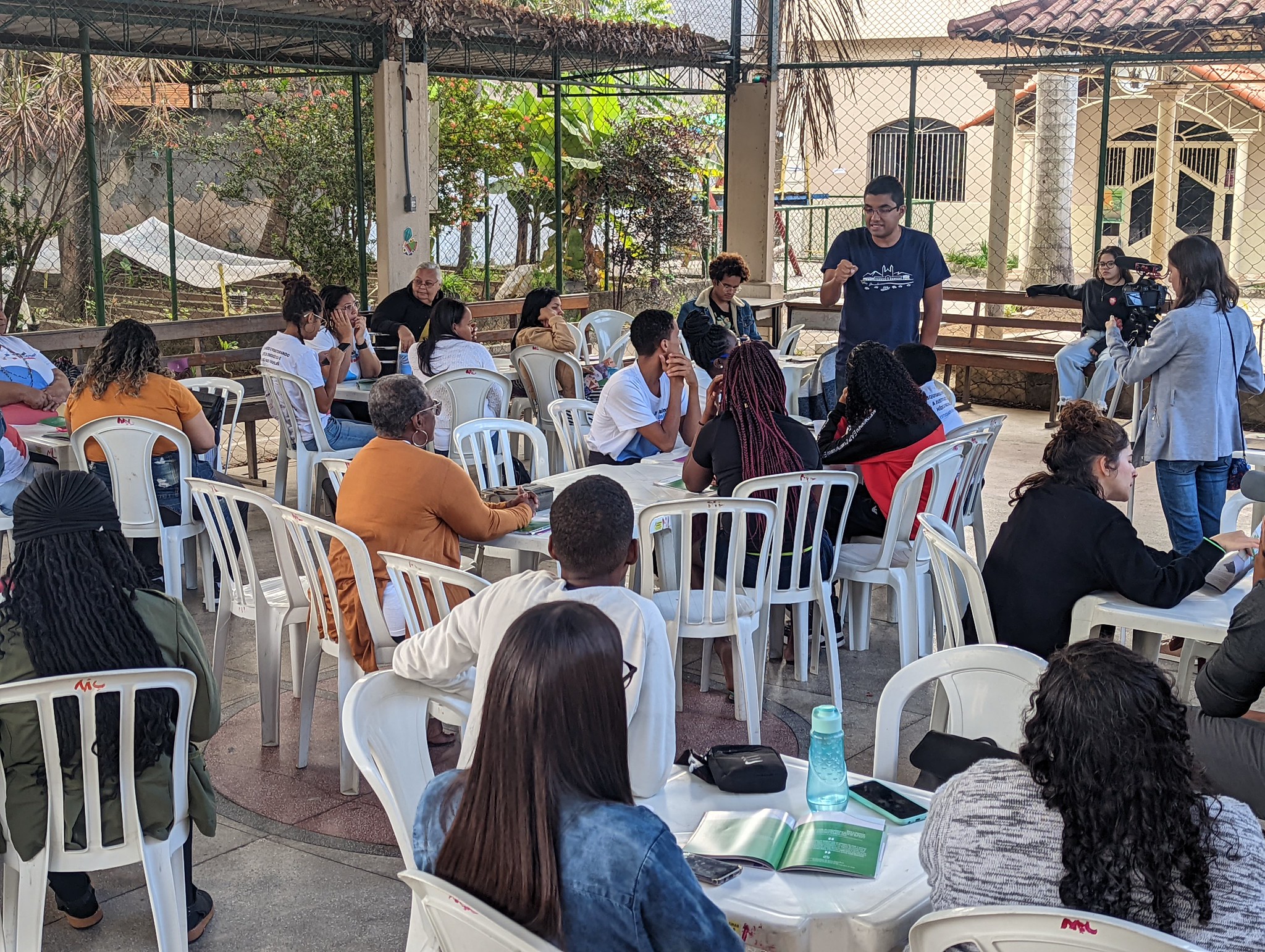
The next module looked at political advocacy based on the data analyzed. Citizen-generated data in the favelas is a mechanism that aims at social change, in this case the fight for the right to water and electricity in terms of access, quality, and efficiency. The advocacy module included contributions by Henrique Silveira from Casa Fluminense and Vinícius Lopes from DataLabe. The module discussed which public policy interventions were wanted and what could be proposed based on the data collected. All participants were encouraged to reflect on possible ways of achieving these solutions. Colin Taylor and Katriana Dubytz from CLASP contextualized the advocacy process within the water and electricity theme by presenting a general view of energy efficiency policies in Brazil, including interested parties and the history of victories and challenges.
The penultimate module of the course was on communicating data and producing the course report. With the data analyzed and understanding what type of advocacy was desired, as well as ways of achieving it, this module covered the data communication aspect. Communication strategies were shared, considering the favelas and urban peripheries, and included how to define the target audience, how to make research results accessible, and how visuals can make the data more compelling for the public. The module was led by Polinho Motta from DataLabe and Bruno Sousa from LabJaca who presented examples of both online and offline communication strategies in the urban periphery. The graphic elements were also debated in this module and the most relevant data, to be shared in the research report, were collectively defined.
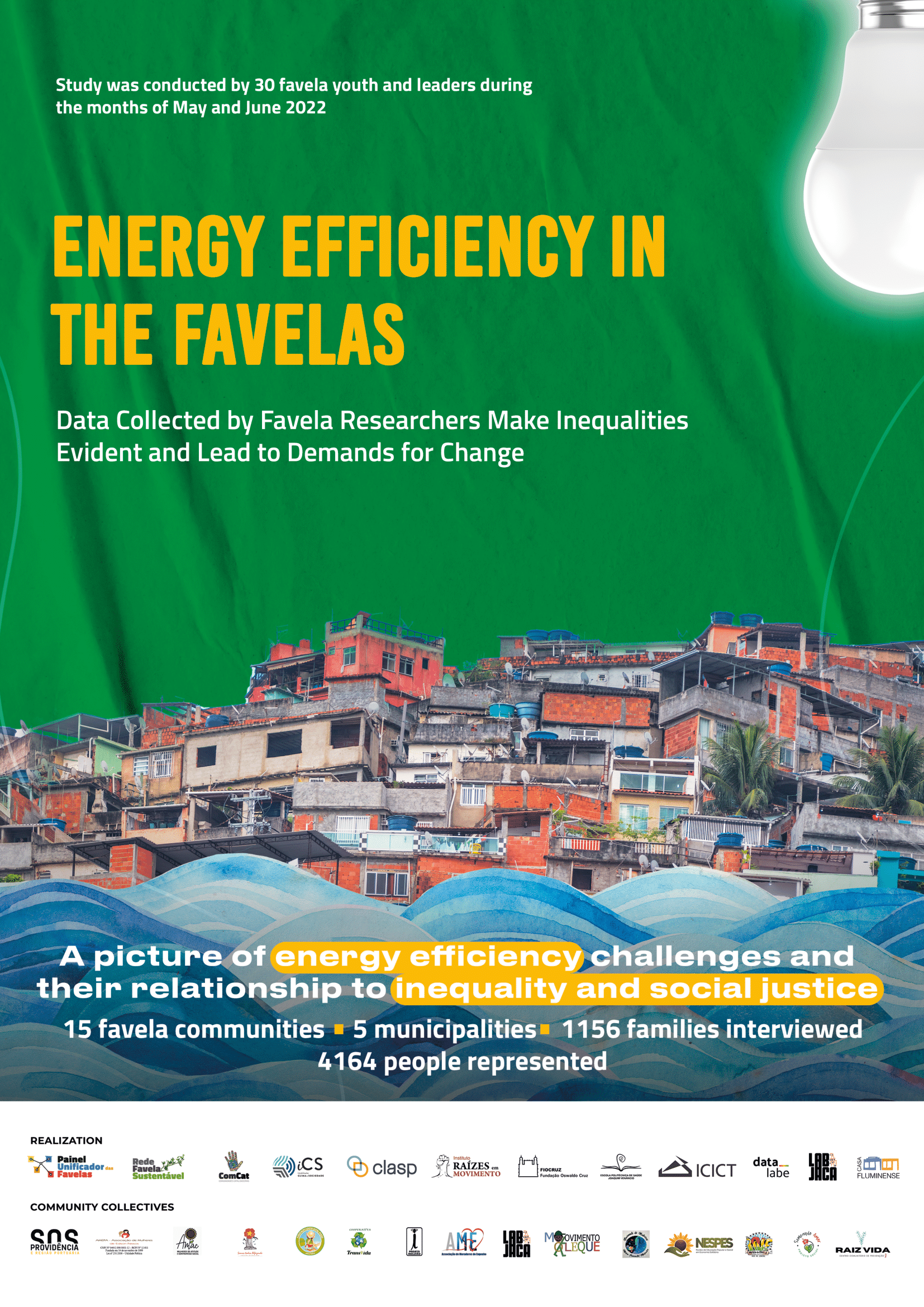
The final module of the course focused on holding the press conference for the launch of the report “Water and Energy Justice in the Favelas: Favela Researchers Gather Data Revealing Inequalities and Calling for Action.” As with the whole research process, the press conference was collectively organized. Students worked together to decide how to present the data, who would present, and in what format. There were rehearsals and preparations ahead of the conference and the launch event and press conference took place on September 22, 2022.
During the press conference, youth presented the research report highlighting the key data from their perspective. They shared their experiences of research in the field and introduced a series of proposals developed in the course to address the lack of access, quality, and efficiency of water and electricity evidenced in the research. At the end, youth and leaders answered questions from journalists and professionals.
The first report, “Water and Energy Justice in the Favelas: Favela Researchers Gather Data Revealing Inequalities and Calling for Action,” summarizes the results of research conducted by participants in the 15 locations covered, with data on 1,156 households, which represent 4,164 people. The report includes an introduction to the research themes, graphs, testimonials, and proposals for action. One of the aims of the report is to present the data in a way that calls the attention of government and utilities to the energy and climate injustice created by the current model.
The second report from the course was released just this year and is based on the potential of exploring energy efficiency with more focus. The new report—“Energy Efficiency in the Favelas: Data Collected by Favela Make Inequalities Evident and Lead to Demands for Change”—reveals unprecedented details on unequal electricity distribution and the impact of inefficiency on poverty in Rio’s favelas. The challenges and significance of the issue are revealed, analyzed, and contextualized in greater depth, intersecting with social and racial aspects of the communities where the research was carried out. The report also considered the findings and conclusions of the data specifically related to the context and challenges of energy efficiency in the favelas.
The research and reports attracted much press attention and were covered by Record, RJTV, TV Globo, Folha de São Paulo, Colabora, G1, Agência Brasil, TV Brasil, Brasil de Fato, Meia Hora, O Dia, Notícia Preta, Rádio Roquete Pinto, Diário do Rio, EPSJV, ICICT, CNN, CREA, and CLASP.
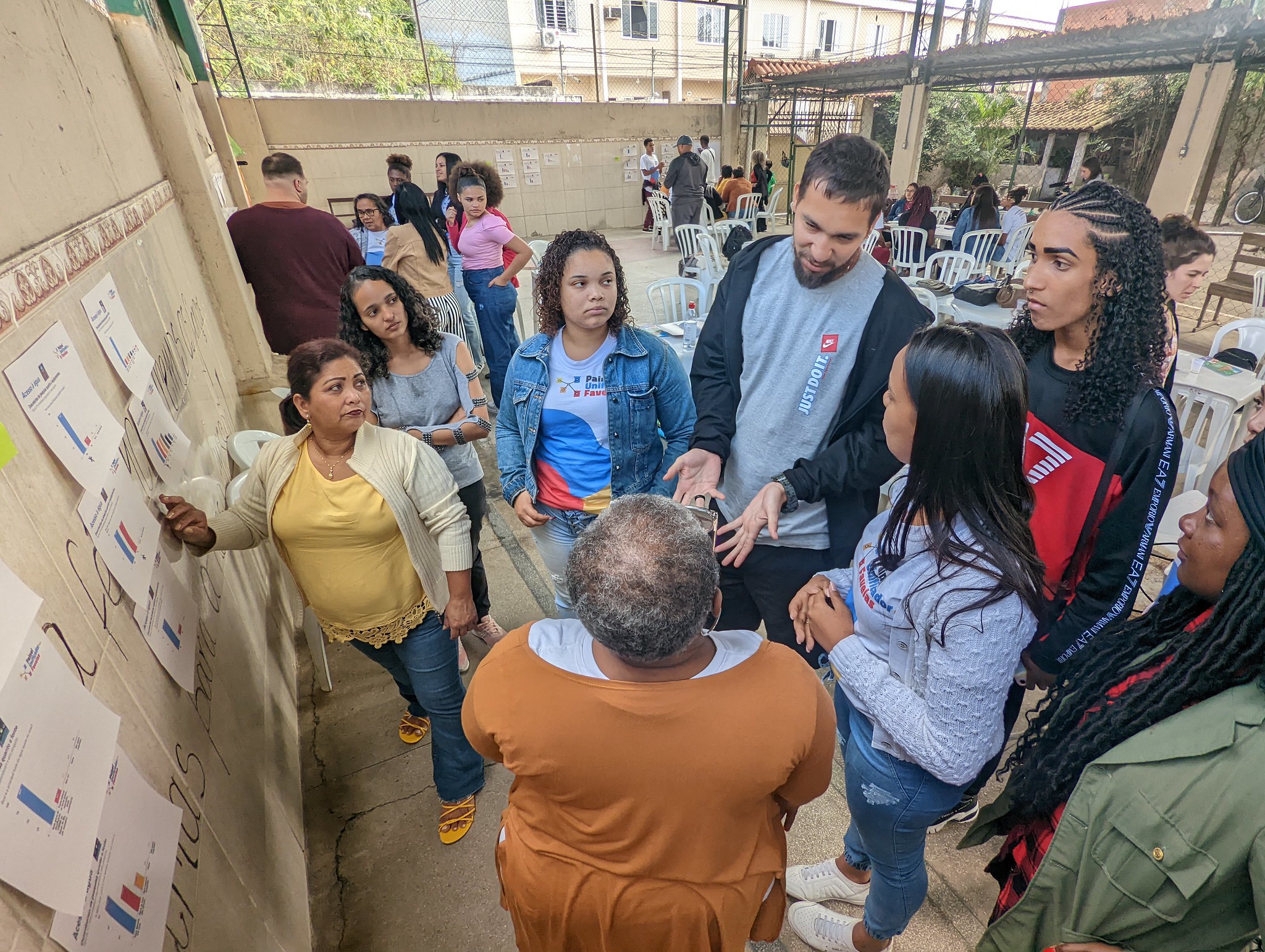
Events are being held in 2023 with the participation of course students to present local versions of the reports with the data from each of the 15 research locations, to residents of each community. The first of these took place on World Water Day, March 22, in Mesquita in the Baixada Fluminense covering data from the Coreia, Cosmorama, and Jacutinga communities, followed by events in the West Zone covering City of God and Rio das Pedras in April and Engenho, Itaguaí in May.
Watch the documentary “Get to Know the Course: ‘Researching and Monitoring Water and Energy Justice in the Favelas” here.
Don’t miss the photo album below, click here to view on Flickr:
*The Sustainable Favela Network (SFN), Favelas Unified Dashboard, and RioOnWatch are initiatives of the NGO Catalytic Communities (CatComm). The course “Researching and Monitoring Water and Energy Justice in the Favelas,” was carried out collaboratively by the following organizations: Roots in Movement, ICICT and EPSJV (Fiocruz), Climate and Society Institute, CLASP, LabJaca, DataLabe, and Casa Fluminense.
**The community organizations which took part in the course and research project were: Alfazendo (City of God/Rio de Janeiro), Centro Social Fusão (Jacutinga/Mesquita), Women of Attitude and Social Commitment Association (Dique da Vila Alzira/Duque de Caxias), Edson Passos Women’s Association (Cosmorama/Mesquita), Association of Itaguaí Warrior Women and Social Organizers (Engenho/Itaguaí), Life Root Community Center (Morro dos Macacos/Rio de Janeiro), Transvida Cooperative (Vila Cruzeiro/Rio de Janeiro, LabJaca (Jacarezinho/Rio de Janeiro), Maria Pimentel Marinho Women’s Movement (Itacolomi/Rio de Janeiro), Museu de Favela (Cantagalo, Pavão-Pavãozinho/Rio de Janeiro), Grassroots Social Education in Solidarity Economy Nucleus (Coréia/Mesquita); Inclusion Project (Éden/São João de Meriti), Projeto Moleque (Pedreira/Rio de Janeiro); Sowing Love Social Project (Rio das Pedras/Rio de Janeiro), SOS Providência (Providência/Rio de Janeiro).

